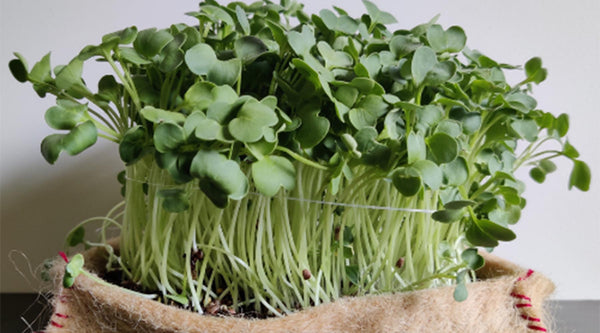
The Surprising Health Benefits of Microgreens: How These Tiny Greens Can Boost Your Nutritional Intake
Microgreens are small, young plants that are typically harvested within 7-14 days of germination. These tiny greens pack a powerful punch when it comes to nutrition. They are packed with vitamins, minerals, antioxidants, and other health-promoting compounds that can boost your nutritional intake and improve your overall health.
Nutrient Density
One of the most surprising health benefits of microgreens is their high nutrient density. These tiny greens are packed with vitamins and minerals such as vitamins A, C, and K, as well as iron, calcium, and potassium. For example, red cabbage microgreens contain up to 40 times more vitamin E than mature red cabbage, and cilantro microgreens contain up to 5 times more vitamin C than mature cilantro. This means that a small serving of microgreens can provide a significant amount of these important nutrients.

Antioxidants
Another health benefit of microgreens is their high antioxidant content. Antioxidants are compounds that protect the body from damage caused by free radicals, which are unstable molecules that can cause cell damage and contribute to the development of chronic diseases such as cancer and heart disease. Microgreens are rich in antioxidants such as carotenoids, flavonoids, and glucosinolates, which can help to protect the body against the harmful effects of free radicals.
Health-Promoting Compounds
Microgreens also contain other health-promoting compounds such as phytochemicals, which are naturally occurring compounds that can help to prevent chronic diseases. For example, broccoli microgreens contain high levels of sulforaphane, a phytochemical that has been shown to have anti-cancer properties.
Weight Management
In addition to their high nutrient density and antioxidant content, microgreens are also low in calories and high in fiber, making them a great food choice for weight management. They also add a unique flavor to dishes, can be grown easily at home, and are easy to incorporate into meals in a variety of ways, such as salads, sandwiches, and smoothies.

Benefits For All Ages
Microgreens are a nutrient-dense food that can provide a wide range of health benefits for people of all ages, including children and the elderly. These tiny greens are packed with vitamins, minerals, antioxidants, and other health-promoting compounds that can support growth and development, promote overall health, and prevent chronic diseases.
Children
For children, microgreens can provide a valuable source of essential nutrients that are important for growth and development. They are particularly high in vitamins A, C, and K, as well as iron, calcium, and potassium, which are all essential for healthy bone growth and development. These vitamins and minerals can also support healthy cognitive function, immune system function, and vision.
The Elderly
For the elderly, microgreens can provide a valuable source of nutrients that are important for maintaining overall health and preventing chronic diseases. They are particularly high in antioxidants, which can protect the body against the harmful effects of free radicals and prevent chronic diseases such as cancer and heart disease. These tiny greens are also high in vitamin K, which is important for maintaining bone health and preventing osteoporosis, a condition that affects many older adults.
Type of Microgreens
There are many different types of microgreens available, each with its own unique flavor, nutritional profile, and growing requirements. Some of the most popular types of microgreens include:
-
Wheatgrass: This type of microgreen is grown from wheat berries and is known for its high chlorophyll content, which gives it a bright green color and a slightly sweet, grassy flavor. Wheatgrass is high in vitamins A, C, and E, as well as minerals such as iron and calcium. It is often used as a dietary supplement and can be consumed fresh, juiced or powdered.
-
Radish: Radish microgreens have a spicy, peppery flavor and are a great source of vitamin C, folate, and potassium. They can be eaten raw or cooked and are a great addition to salads, sandwiches, and other dishes.
-
Sunflower: Sunflower microgreens are grown from sunflower seeds and have a mild, nutty flavor. They are high in vitamins A and C, as well as minerals such as iron and zinc. They are also a good source of protein and can be eaten raw or cooked.
-
Pea Shoots: Pea shoots have a delicate, sweet flavor and are a great source of vitamin C, vitamin A, and iron. They can be eaten raw or cooked and are a great addition to salads, sandwiches, and other dishes.
-
Broccoli: Broccoli microgreens are similar in taste to adult broccoli but with a milder taste. They are high in vitamins C, K, and A, and also contain sulforaphane, which is a compound that has been shown to have anti-cancer properties.
-
Mustard: Mustard microgreens have a spicy, tangy flavor and are a good source of vitamin C, vitamin A, and vitamin K. They are also high in calcium, iron, and zinc.
-
Basil: Basil microgreens have a strong, sweet basil flavor and are high in vitamins A and K, as well as iron and calcium. They can be eaten raw or cooked and are a great addition to salads, sandwiches, and other dishes.
-
Arugula: Arugula microgreens have a slightly spicy, nutty flavor and are a good source of vitamin C, vitamin A, and iron. They can be eaten raw or cooked and are a great addition to salads, sandwiches, and other dishes.
These are just a few examples of the many types of microgreens available. Each type of microgreen has its own unique flavor, nutritional profile, and growing requirements, so it's important to research and choose the ones that best suit your taste and dietary needs. Microgreens can be grown easily at home or can be found at farmers' markets or supermarkets. They can be eaten raw in salads, or sandwiches, as a garnish, or added to soups, stews, and other dishes for a nutritional boost.
Conclusion
In conclusion, microgreens are a powerful food that can boost your nutritional intake and improve your overall health. Their high nutrient density, antioxidant content, and other health-promoting compounds make them a great food choice for anyone looking to improve their diet and support their health.

